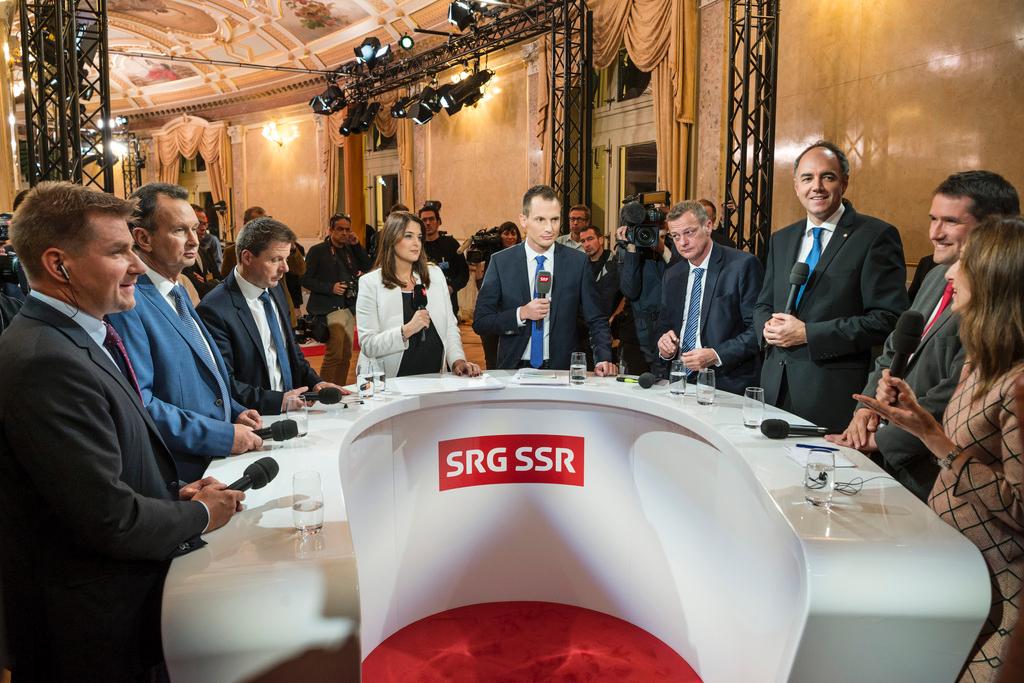Shift to the right not as clear-cut as it seems

The shift to the right in the Swiss parliament is unlikely to have a huge impact, according to political scientist Marc Bühlmann. Following Sunday's elections, parties on the right now form an absolute majority in the House of Representatives.
Right-leaning parties now have 101 seats in the house. This, along with the Senate, forms the Swiss parliament. The largest party in the house remains the conservative right Swiss People’s Party, which gained 11 seats and now has 66, or one-third of the 200 in the chamber.
swissinfo.ch: The People’s Party was able to build on an already strong base in the House of Representatives. Was this because of their position on asylum issues or because of their opposition to agreements with the European Union (EU)?
Marc Bühlmann: There are various reasons. On the one hand there was probably a different type of mobilisation to [the last election] four years ago. This has to do with the issues: four years ago we had [nuclear disaster at] Fukushima, which mobilised a mostly urban population which then tended to vote for the [left-wing] Green or [centrist] Liberal Green Party.
Let’s look at the numbers from the city of Zurich: this time the Left made gains in the city. The People’s Party lost out there, but made large gains in the countryside. This means that the conservative-leaning rural population, which regularly take part in polls, were much more motivated to vote. The main issue of this campaign was asylum policy and this pretty much played into the hands of the People’s Party. European policy was not really an issue for the parties.
swissinfo.ch: What happened to the Green and Liberal Green parties? Are climate change and the environment no longer on voters’ agenda?
M.B.: It looks like these issues didn’t really grab people. It may be that these parties did not have enough visibility during the campaign. The alternative is something that has been in the offing for the last eight years: environmental issues are no longer a niche interest. The Greens are still seen as an important party for these issues. But, all of the other parties have learnt a lot and now show some interest in the environment. If you could look into the future, you might say that the division between the Greens and the Liberal Greens led to the demise of the environment as a niche political topic for one sole party.
Marc Bühlmann
The political scientist from canton Glarus teaches at the Universities of Zurich and Bern. Since 2011 he has been in charge of the Swiss Yearbook for Politics at the Institute for Political Science at the University of Bern.
swissinfo.ch: What does the shift towards the right mean for the day-to-day business in parliament?
M.B.: Some issues will be more pronounced. Financial policy and austerity measures will probably have an easier ride in the House of Representatives. But ultimately the numbers aren’t so dramatic. Politics in Switzerland will still take place in the committees. It is important how these are put together; it is in these committees that compromises are sought. What we can expect – although we don’t yet know all of the results from the Senate – is that there will be more stand-offs between the two chambers.
swissinfo.ch: So will there be more stalemates than before between the two parliamentary chambers?
M.B.: Yes, the Senate has nearly always historically been the chamber that corrects or ever so slightly controls the more excessive or unpleasant notions that come out of the House of Representatives. Now there is an absolute majority for the right in the House of Representatives. This could lead to several bills not making it through.
swissinfo.ch: What’s the outlook for the 2050 Energy Strategy, which includes Switzerland’s withdrawal from nuclear power?
M.B.: Another probable outcome of Sunday is that some issues and parties will become marginalised. We know that in these circumstances, minority parties in Switzerland rely more heavily on direct democracy. I should think that referenda will become more common across all topics, not just in energy issues.
swissinfo.ch: On the issues of immigration and the EU bilateral accords, it will be more difficult for the People’s Party to find a majority, as the [centre-right] Radical Party is in favour of good relations with the EU.
M.B.: This topic is a very good example of how we should take a nuanced approach to this shift to the right. Here the Radicals are most definitely not on the same page as the People’s Party who in turn are in the minority on this topic, as before. Solutions will be found that will not be to the People’s Party’s taste.
swissinfo.ch: How will the Radical Party handle having this key role in parliament?
M.B.: The Radicals are now in a strategic position; in terms of numbers, they have emancipated themselves from the People’s Party. They are no longer just the junior partner of the People’s Party anymore which has to do as the party says. They can vote towards the centre-right now, i.e. with the [centrist] Christian Democratic Party.
swissinfo.ch: Will we see further tightening up of asylum laws?
M.B.: If we look at developments in this area, we still have the People’s Party [at the fore], which is very conservative in terms of asylum. They have even launched a referendum on the asylum law, and this is how it will go on. This is the People’s Party’s big topic, and they will be hardline over it. The Radicals won’t necessarily offer to lend a hand on asylum… although they will naturally lean more to the right on this issue.
swissinfo.ch: The right-leaning parties can count on a majority of 101 votes, if they’re all in agreement. What’s the significance of this?
M.B.: There are many different possibilities for making coalitions. The arguments between the People’s Party and the Radicals will continue. Collaboration will be possible in some cases, but not all. The absolute majority of 101 votes will only occur on rare occasions.
swissinfo.ch: Everyone is already talking about the cabinet elections which take place on December 9. As the strongest party, which is now even stronger than before, the People’s Party has been calling for a second seat in the [seven-seat] cabinet for a long time. Has their moment come?
M.B.: There are different sides to this discussion. What surprised me on Sunday was that when the People’s Party said that they had the right to two seats in the cabinet, and the question arose as to whether they would take on more responsibility in terms of compromises, party president Toni Brunner was extremely evasive on this issue.
The other side to this debate is that we currently have a very stable cabinet. We rarely have the situation that one of the cabinet members steps out of line concerning the very important concept of collegiality, something that used to happen quite a lot. We shouldn’t dismiss the saying, ‘never change a winning team’.
We have to wait for Eveline Widmer-Schlumpf’s decision. If she wants to serve another four-year term, I should think that she would have a chance to be re-elected.
Widmer-Schlumpf’s seat
The Swiss People’s Party wants a second seat in cabinet, claiming the second post in government it lost in 2008 when Finance Mininster Eveline Widmer-Schlumpf left the party.
Her position looks unclear as her centre-right Conservative Democratic Party slumped from 5.4% in 2011 to 4.1%.
She is yet to make a statement as to her intentions.
Translated from the German by Jo Fahy

In compliance with the JTI standards
More: SWI swissinfo.ch certified by the Journalism Trust Initiative











You can find an overview of ongoing debates with our journalists here . Please join us!
If you want to start a conversation about a topic raised in this article or want to report factual errors, email us at english@swissinfo.ch.